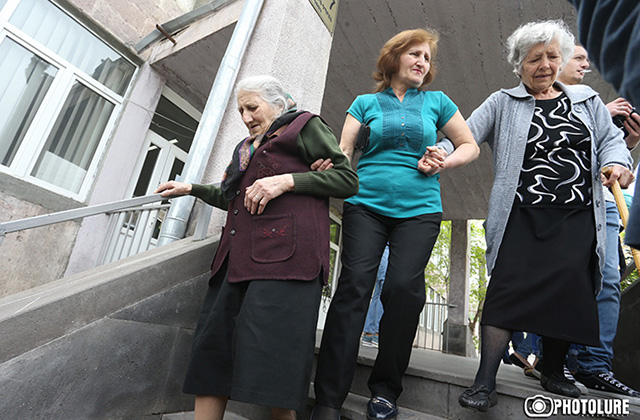Yerevan’s predictable elections

Yerevan City Council elections were held on May 14. Initial results have already been published: RPA, headed by incumbent mayor Taron Margaryan has won in the elections. Based on data issued by the Central Electoral Commission (CEC) 71.25 percent of citizens (240 036 votes) have cast votes in favor of RPA.
21 percent (70 731 votes) of citizens voted for “Yelk” bloc, and 7.75 percent (26 109 votes) of citizens voted for “Yerkir Tsirani”.
Leaving political and legal issues aside, let’s simply analyze this snapshot.
Firstly, Yerevan City Council elections were marked with rather low participation. Only 345 thousand out of 840 thousand eligible citizens have gone to the polling stations. Participation level comprises 41 percent. To compare, it should be noted that at NA elections lasted only for 40 days around half million citizens brought their participation. Thus, number of citizens not participating at NA elections increased by 150-155 thousand at Yerevan elections.
However, all this wasn’t predictable, and despite RPA’s impressive 71.25 percent, almost identical election was recorded, like on April 2. To get convinced it’s enough to compare the gained votes.
Thus, 240 036 citizens cast their votes at Yerevan City Council elections. During NA elections RPA gained 241 082 votes in Yerevan. Number of RPA votes reduced only by 1000 or 0.4 percent.
70 731 citizens voted for “Yelk” bloc, and at NA elections—69 465. Votes of “Yelk” increased by 1200 or by 1.8 percent.
This shows that at the moment “Yelk” has stabile electorate, which hasn’t changed throughout last month.
Voters of other 7 political powers at NA elections—150 155 thousand, stayed at home. Little part—26 thousand decided to cast vote for “Yerkir Tsirani” (although this is presumption, probably people staying at home at NA elections have voted for the party).
In short, these numbers show that the impressive 72.25 percent of RPA was recorded due to low participation, i.e. there is no increase in number of supporters.
This indirectly edifies of something else. At NA elections RPA’s leading figure was Karen Karapetyan, this time PM’s factor lacked. It turns out that with or without PM RPA gained almost the same number of votes. In its turn, this means that the role of PM’s factor at NA elections was exaggerated and people having authority and position in separate districts have mostly provided votes for RPA.
By the way, the snapshot is rather interesting, when we observe elections results per administrative districts. Firstly it should be stated that the highest percentage of votes in favor of RPA was recorded in Nubarashen (85.5 percent), Nork Marash (80.02 percent) and Avan (78.95 percent). The lowest was recorded in Kanaker-Zeytun administrative district—57.77 percent.
If we separate the statistics of RPA and “Yelk” per administrative district, we may see that RPA’s votes have decreased the most in Kanaker-Zeytun. On May 14 elections RPA gained 10 982 votes in this administrative district instead of 17 099 of April 2 elections.
In Malatia-Sebastia administrative district RPA’s votes decreased by 3694 (13.1 percent), in Ajapnyak—by 1556 (5.4 percent), in Shengavit—by 1075 (2.6 percent) and in Nor Nork. In other administrative districts RPA gained more votes, than during parliamentary elections (the most RPA’s votes increased in Erebuni—3781).
As for “Yelk” bloc, in 5 out of 12 administrative districts gained votes have reduced, and in 7—increased.
Finally, let’s make a strictly subjective calculation linked to election bribe. As already mentioned, RPA gained 240 thousand votes in the capital. Suppose, they are all bought votes. Based on circulated news 10-15 thousand was given for a vote. Let’s accept 15 thousand drams. It turns out, that RPA in Yerevan gave AMD 3.6 billion or USD 7.5 million election bribe.
It should be noted once again, that this is assumption. In any case this USD 7.5 million is the exaggerated number. And this gives way to rather upsetting conclusions. It turns out that by USD 7.5 million one may buy the leadership of one of the oldest cities of the world—Yerevan.
Meanwhile, on the other hand, we have half a million citizens of Yerevan, not participating in it, who consider themselves clean-fingered and principal. Would election bribe play a role if at least half of those citizens took part? It’s a big issue.
By Babken Tunyan

























